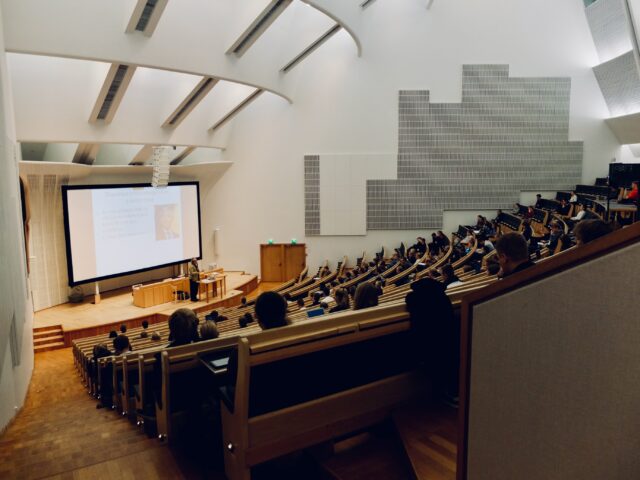McGill University and Modern TX, Inc recently announced that they are collaborating on two lipid nanoparticle (LNP) research projects. LNPs are vital components in mRNA medicines, including vaccines. The first project will run for three years and will investigate how to enhance the cell-specific delivery of cargo, like mRNA. The second project will run for an initial one-year period and will characterize LNPs so that their specific size and payload distribution is better understood. “With Moderna’s support, these two highly specialized research projects have the potential to accelerate the application of LNPs in the development and delivery of mRNA therapies for a range of diseases,” said McGill Vice-Principal, Research and Innovation Martha Crago.

Top Ten News
July 21, 2023
Vancouver Community College and the Canadian Armed Forces (CAF) are collaborating to address the increasing demand for heavy duty mechanics across the country. This collaboration will provide CAF personnel with heavy duty mechanical training while incentivizing civilian students to pursue a career in the military. “Cultivating strong partnerships with industry leaders means we can prepare students for success in the workforce,” said VCC Acting Dean, School of Trades, Technology & Design Lucy Griffith. “We thank the Canadian Armed Forces for their collaboration and look forward to a long and productive partnership that provides military personnel with the skills and experience needed for a successful career in heavy mechanical trades.”
To accommodate the recent expansions to its two-year paramedic program, Cambrian College has introduced a one-time January intake. The college is accepting an additional 40 students to its Paramedic program as part of a province-wide effort to boost the number of practicing paramedics: 20 of the seats will be added to the typical September intake, while the other 20 seats will begin in January. “We are committed to helping address the current health human resource crisis to ensure that communities have the paramedics they need,” said Cambrian School of Health Sciences and Emergency Services Dean June Raymond.
In a three-part series of editorials in the Chronicle of Higher Ed, reporter Taylor Swaak conducts a deep dive on the use of courseware in postsecondary education. The first of these editorials demonstrates that courseware can often “replace the professor,” as digital tools–like online textbooks and assignments–become increasingly common. Swaak explains that while courseware can provide instant feedback to students, it can also make the classroom experience highly impersonal. The second of these editorials demonstrates the significant cost of courseware, which flies “in the face of efforts by both student-advocates and legislators to make college more affordable.” The final installment points to the data-privacy concerns with courseware products, underlining the risks that come with mandated use of courseware.
Royal Roads University and the University of the Philippines Los Baños are collaborating on a climate action leadership program in the Philippines. The two parties signed a Memorandum of Understanding to explore the co-development of a climate action leadership program for PSE professionals in the Philippines. The nine-month program is expected to be delivered in a blended format that will include a short residency in Victoria, BC and a final capstone presentation in the Philippines.
The University of Manitoba and health care organization Shared Health have partnered to improve wait times and patient access to health care through the Access Improvement Model (AIM) program. Clinics that go through the AIM program take part in eight workshops and modules, as well as a mentored project, in order to review their care practices. The program examines everything from the experience of the patient making an appointment to their time in the examination room. “It’s really helped us to assess what we’re doing and why we’re doing things,” said Teri Greenwood, primary care manager for ACCESS Fort Garry.
Two universities have recently ratified collective agreements with unions. Brock University and Brock University Faculty Association have ratified an agreement that was tentatively reached earlier this month. The agreement includes an increase in the overall faculty and professional librarian complement, an expansion of mental health benefits, and the conversion of qualified members into new teaching-intensive appointments. At the University of Northern British Columbia, the university and CUPE Local 3799 have ratified a new collective agreement. The agreement includes changes such as general wage increases in line with BC’s Shared Recovery Mandate, two days of Indigenous employee leave, and group benefit increases.
FP Canada™ has announced that financial planning certification candidates with significant relevant work experience will no longer need to hold a college diploma in order to receive their QAFP® certification. Previously, applicants were required to hold a two-year college diploma, have one year of qualifying work experience, pass the QAFP® exam, and meet other FP Canada educational requirements. The change—which indicates that candidates with five years of qualifying work experience will no longer need to hold a diploma—is intended to make the financial planning profession more accessible to a larger pool of candidates. “For those who have proven their ability to meet the demands of the profession, we’re excited to offer a new path to certification,” said FP Canada President Tashia Batstone.
Thompson Rivers University has announced a partnership with the Canadian Statistical Sciences Institute (CANSSI) to further develop the university’s data science program. CANSSI brings together statistics departments from more than 30 universities across the country to foster collaborative research and innovation. “I’m excited about the opportunities that our participation in CANSSI will open up to our students, post-doctoral fellows and faculty,” said TRU Faculty of Science Dean Dr Greg Anderson. “Our participation allows us access to various forms of support, funding and interdisciplinary collaboration that are important for TRU as we continue to develop our programming in statistics and data science.”
The Government of Québec has invested nearly $2.4M into sustainable forest management projects at postsecondary institutions and centres across the province. Five of the nine projects will be carried out by researchers from the Université du Québec network: Yan Boucher (Université du Québec à Chicoutimi), Frédérik Doyon (Université du Québec en Outaouais), Audrey Maheu (UQO), Maxence Martin (Université du Québec en Abitibi-Témiscamingue), and Philippe Nolet (UQO). Two will be carried out by Université Laval researchers Évelyne Thiffault and Eric R Labelle. The two remaining projects will be conducted by Jean Marchal and Gilles Joanisse, researchers from the Centre d’enseignement et de recherche en foresterie based out of the Cégep de Sainte-Foy. QC states that an additional $2M has been set aside for another round of projects in 2023-24.
